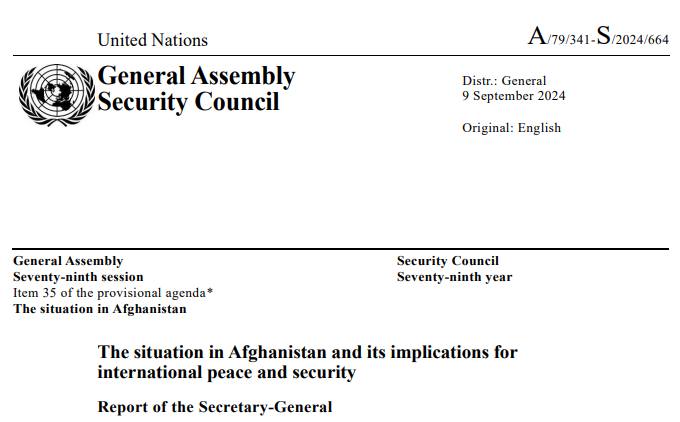19 Jan,26
Most Searched Keywords
03 Aug
Report of the UN Secretary-General on Afghanistan and the Implementation of the Mandate of the United Nations Assistance Mission in Afghanistan (UNAMA)
by Kamran Noori

Summary of the Economic Section of the UNAMA Report
Afghanistan is currently facing serious economic challenges, which have worsened since the Taliban took control in August 2021. These challenges are mainly caused by poor domestic governance, international sanctions, and a growing humanitarian crisis. This brief overview looks at how sanctions, governance, the humanitarian situation, and efforts at regional cooperation are shaping Afghanistan’s economic situation.
Since the Taliban came into power, Afghanistan has been largely isolated from the international community. Sanctions were imposed, and many international aid programs once critical to supporting the Afghan economy have been frozen or cut off. As a result, Afghanistan now has very limited access to global markets and foreign investment. Economic activity inside the country has slowed significantly, and growth has nearly stopped.
Alongside this isolation, Afghanistan is experiencing a deep humanitarian crisis. More than half of the population around 23.7 million people—are in need of humanitarian assistance. Yet in 2024, only about 24.9% of the $3.06 billion required in aid has been delivered. This means that most available resources are going toward emergency relief rather than long-term development, which weakens the economy further. The country remains stuck in poverty, heavily dependent on aid, with no clear path toward recovery.
The country is also dealing with inflation and a trade slowdown. By mid-2024, Afghanistan’s trade deficit had grown to $3.9 billion. Imports had increased by 23%, while exports had dropped by 14%. This growing gap reflects a weak and struggling economy. Exports to key partners like Pakistan especially coal have declined sharply, with coal exports down by 76%. These changes point to worsening trade relationships and reduced income.
On the positive side, government revenues have increased slightly. In the first four months of 2024, the Afghan government reported $1 billion in revenue, which is 11% more than the same period last year. However, this growth is not enough to make up for the wider economic losses caused by isolation and sanctions. The value of the Afghan currency has remained relatively stable compared to its value in August 2021. In July 2024, the Afghani was 21.3% stronger against the US dollar.
Despite its global isolation, Afghanistan has tried to improve its economic ties with neighboring countries. The Taliban-led government has taken part in bilateral and regional meetings to explore opportunities for trade, infrastructure development, and investment. These efforts include pursuing trade agreements that focus on lowering tariffs and improving cross-border business. By strengthening regional trade routes and cooperation, the country hopes to reduce the impact of international sanctions.
There have also been attempts to improve infrastructure in areas like transport and energy, with some regional partners showing interest in supporting such projects. These improvements could help create a better environment for investment and increase Afghanistan’s economic importance in the region. The government has also tried to encourage investment in sectors like agriculture, mining, and renewable energy. However, due to weak governance and ongoing sanctions, there has been little actual foreign investment so far.
All of these challenges have serious consequences for Afghanistan’s future development. Long-term recovery will depend on resolving governance problems, improving trade, and attracting secure investment—especially in critical sectors like infrastructure and agriculture. But continued isolation and restrictive policies are major barriers. On top of that, the ongoing economic slowdown and widening trade deficit are further delaying progress.
In conclusion, Afghanistan’s economic crisis presents a serious threat to its future. Recovery will require major changes in governance, more trade opportunities, and investment in key areas. Yet without support from the international community and efforts to end isolation, progress will remain out of reach. If the world continues to ignore Afghanistan’s economic needs, it may also harm regional stability.
